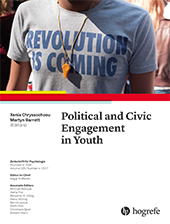Abstract
Abstract. We examined conservative ideological shift among adolescents by assessing the effect of different types of threat on the self-reported political orientation of 183 New York City high school students and investigated the mediating role of system justification. Participants read one of three newspaper passages: (1) a system-related passage that described flaws in the American social, economic, and political system; (2) a self-related passage that described the deleterious health effects of cell phone use; or (3) a control passage that described house plant cultivation. Participants then completed measures of system justification and political orientation. As hypothesized, a threat to the system (but not the self) increased self-reported conservatism indirectly through its effect on system justification. This suggests that when the overarching social system is threatened, adolescents may be drawn to conservative ideology and that this is attributable, at least in part, to a heightened desire to defend and bolster the societal status quo.
References
(2009). Evidence of system justification in young children. Social and Personality Psychology Compass, 3, 918–926. https://doi.org/10.1111/j.1751-9004.2009.00214.x
(2006). Conservative shift among high-exposure survivors of the September 11th terrorist attacks. Basic and Applied Social Psychology, 28, 311–323. https://doi.org/10.1207/s15324834basp2804_4
(2013). Death goes to the polls: A meta-analysis of mortality salience effects on political attitudes. Political Psychology, 34, 183–200. https://doi.org/10.1111/pops.12005
(2006). Effects of terrorism on attitudes and ideological orientation. European Journal of Social Psychology, 36, 259–265. https://doi.org/10.1002/ejsp.294
(2006). The development of system justification in the developing world. Social Justice Research, 19, 365–378. https://doi.org/10.1007/s11211-006-0012-x
(2017). Ideological asymmetries and the essence of political psychology. Political Psychology, 38, 167–208. https://doi.org/10.1111/pops.12407
(2004). A decade of system justification theory: Accumulated evidence of conscious and unconscious bolstering of the status quo. Political Psychology, 25, 881–920. https://doi.org/10.1111/j.1467-9221.2004.00402.x
(2017). Missing in (collective) action: Ideology, system justification, and the motivational antecedents of protest behavior. Current Directions in Psychological Science, 26, 99–108. https://doi.org/10.1177/0963721417690633
(2003). Political conservatism as motivated social cognition. Psychological Bulletin, 129, 339–375. https://doi.org/10.1037/0033-2909.129.3.339
(2008). Ideology: Its resurgence in social, personality, and political psychology. Perspectives on Psychological Science, 3, 126–136. https://doi.org/10.1111/j.1745-6916.2008.00070.x
(2017). The politics of fear: Is there an ideological asymmetry in existential motivation? Social Cognition, 35, 324–353. https://doi.org/10.1521/soco.2017.35.4.324
(2012).
System justification theory . In P. A. M. van LangeA. W. KruglanskiE. T. HigginsEds., Handbook of theories of social psychology (pp. 313–343). London, UK: Sage.(2003). Complementary justice: Effects of “poor but happy” and “poor but honest” stereotype exemplars on system justification and implicit activation of the justice motive. Journal of Personality and Social Psychology, 85, 823–837. https://doi.org/10.1037/0022-3514.85.5.823
(2005). Victim derogation and victim enhancement as alternate routes to system justification. Psychological Science, 16, 240–246. https://doi.org/10.1111/j.0956-7976.2005.00810.x
(2010). Rally effects, threat, and attitude change: An integrative approach to understanding the role of emotion. Journal of Personality and Social Psychology, 98, 886–903. https://doi.org/10.1037/a0019086
(2004). Deliver us from evil: The effects of mortality salience and reminders of 9/11 on support for President George W. Bush. Personality and Social Psychology Bulletin, 30, 1136–1150. https://doi.org/10.1177/0146167204267988
(2014). A social-cognitive analysis of system justification goal striving. Social Cognition, 32, 95–129. https://doi.org/10.1521/soco.2014.32.2.95
(1986). Stability and change in political attitudes: Observed, recalled, and “explained”. Political Behavior, 8, 21–44. https://doi.org/10.1007/BF00987591
(2005). Defensive pride and consensus: Strength in imaginary numbers. Journal of Personality and Social Psychology, 89, 978–996. https://doi.org/10.1037/0022-3514.89.6.978
(2009). Conservative shift among liberals and conservatives following 9/11/01. Social Justice Research, 22, 231–240. https://doi.org/10.1007/s11211-009-0098-z
(2009). Threat causes liberals to think like conservatives. Journal of Experimental Social Psychology, 45, 901–907. https://doi.org/10.1016/j.jesp.2009.04.013
(1997). Why do we need what we need? A terror management perspective on the roots of human social motivation. Psychological Inquiry, 8, 1–20. https://doi.org/10.1207/s15327965pli0801_1
(2015). The 9/11 conservative shift. Economics Letters, 135, 80–84. https://doi.org/10.1016/j.econlet.2015.07.031
(2011). Motivated closed‐mindedness mediates the effect of threat on political conservatism. Political Psychology, 32, 785–811. https://doi.org/10.1111/j.1467-9221.2011.00840.x
(2015). A sense of powerlessness fosters system justification: Implications for the legitimation of authority, hierarchy, and government. Political Psychology, 36, 93–110. https://doi.org/10.1111/pops.12183



